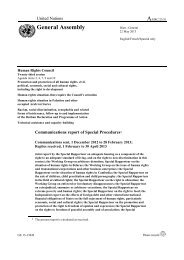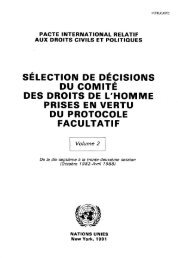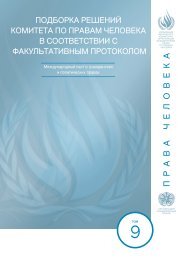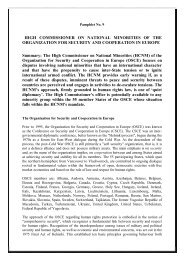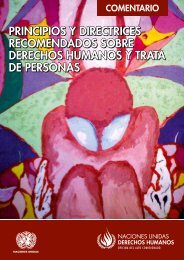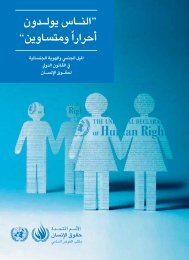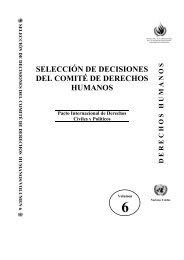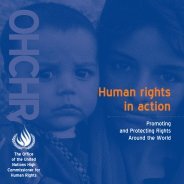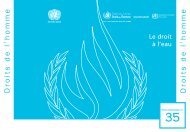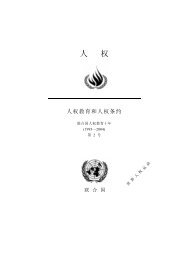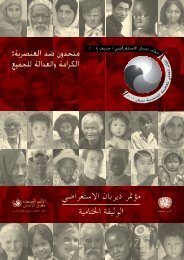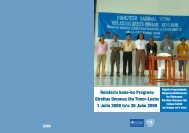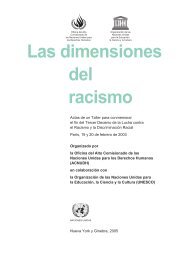good governance practices for the protection of human rights
good governance practices for the protection of human rights
good governance practices for the protection of human rights
You also want an ePaper? Increase the reach of your titles
YUMPU automatically turns print PDFs into web optimized ePapers that Google loves.
Response<br />
An Ecuadorian multi-agency ef<strong>for</strong>t, launched in 1998, attempted to inject transparency<br />
in <strong>the</strong> budget process and create avenues <strong>for</strong> public participation. The<br />
ef<strong>for</strong>t was motivated by <strong>the</strong> conviction that transparency, civil advocacy and public<br />
participation could lead to an increase in and a more equitable distribution<br />
<strong>of</strong> social spending. Transparency and inclusion at every stage <strong>of</strong> <strong>the</strong> budget<br />
process might also ensure that social expenditures were more efficient and accountable.<br />
Fur<strong>the</strong>rmore, <strong>the</strong> programme was motivated by <strong>the</strong> understanding that <strong>the</strong><br />
publication <strong>of</strong> credible in<strong>for</strong>mation on economic and financial indicators could<br />
foster a debate on appropriate levels <strong>of</strong> social spending by <strong>the</strong> Government.<br />
Design<br />
In 1998, a team <strong>of</strong> national economists working on a project funded by <strong>the</strong> United<br />
Nations Children’s Fund (UNICEF) analysed Ecuador’s budget and spending<br />
patterns and found that spending on social programmes was plummeting. Specifically,<br />
investment in education dropped from US$ 611 million in 1996 to<br />
US$ 331 million in 1999, while spending on health fell from US$ 198 million<br />
to US$ 96 million. Spending on social sectors was disproportionately low compared<br />
to allocations <strong>for</strong> debt repayment and o<strong>the</strong>r non-social sectors. In addition,<br />
certain regions, particularly those with a majority indigenous population,<br />
were not getting a fair share <strong>of</strong> social benefits.<br />
Following this research and analysis, a discussion with government <strong>of</strong>ficials led<br />
to an agreement by <strong>the</strong> President to track social expenditures and <strong>the</strong> key indicators<br />
<strong>of</strong> <strong>the</strong> economic crisis using <strong>the</strong> database <strong>of</strong> <strong>the</strong> Ministry <strong>of</strong> Economy and<br />
Finance. The Government would collect <strong>the</strong> necessary in<strong>for</strong>mation in order to<br />
effectively link its public finance and social policy. The Government also agreed<br />
that it would share <strong>the</strong> in<strong>for</strong>mation with <strong>the</strong> public so as to increase transparency<br />
and public awareness. Finally, <strong>the</strong> Government asked UNICEF to create a system<br />
<strong>for</strong> monitoring trends in social spending.<br />
Implementation<br />
The collaborative initiative between <strong>the</strong> Social Front, which is a government department<br />
coordinating <strong>the</strong> work <strong>of</strong> 11 State institutions dealing with social issues,<br />
<strong>the</strong> Ministry <strong>of</strong> Economy and Finance, and UNICEF aimed to inject transparency<br />
into every stage <strong>of</strong> <strong>the</strong> budgeting process. The programme focused on monitoring<br />
budget <strong>for</strong>mulation and implementation. It also encouraged <strong>the</strong> active participation<br />
<strong>of</strong> civil society organizations, such as <strong>the</strong> Fiscal Policy Observatory and <strong>the</strong><br />
Observatory <strong>for</strong> <strong>the</strong> Rights <strong>of</strong> Children and Adolescents.<br />
A series <strong>of</strong> dialogues on <strong>the</strong> budget including <strong>the</strong> Congress, <strong>the</strong> Social Front,<br />
<strong>the</strong> Ministry <strong>of</strong> Economy and Finance, civil society, <strong>the</strong> mass media, UNICEF<br />
and <strong>the</strong> Fiscal Policy Observatory took place between 2000 and 2004. Discussions<br />
on <strong>the</strong> budget took place around <strong>the</strong> country. Among o<strong>the</strong>r issues, <strong>the</strong><br />
dialogues concluded that, first, <strong>for</strong>eign debt payments demanded a large share<br />
36



